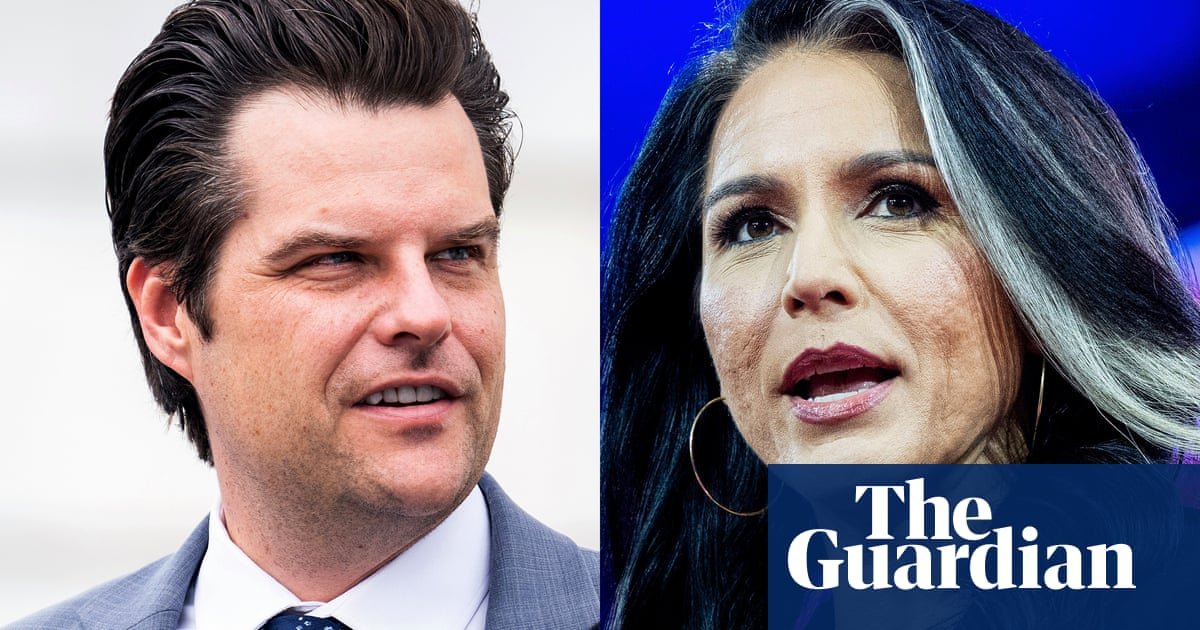Concerns have grown that Donald Trump’s second presidency will be more extreme than his first amid a wave of top nominations that opponents have criticized as going from bad to worse.
Dismay over some of the president-elect’s early picks escalated into outrage after it was revealed that far-right Florida congressman Matt Gaetz had been selected for attorney general — a position Trump has previously said he considers the most important of his administration.
The choice has sparked disbelief, even among Republicans, and has raised fears that Trump intends to carry out mass firings at the Justice Department in retaliation for the criminal investigations the department instigated against him.
Trump reportedly chose Gaetz, 42, after the congressman — who was himself the subject of a two-year Justice Department investigation into suspected sex trafficking that ended without charges — told Trump: “Yes, I’m going to go out there and start cutting the damn things.” “. “Heads.”
Others who have been nominated for the position have been rejected because they are too concerned with legal concepts or constitutional details.
Ty Cobb, White House lawyer during Trump’s first term, called Gaetz’s nomination “a huge insult to America.”
“Matt Gaetz is simply unqualified… academically, professionally, morally, morally and empirically,” he told CNN this week.
On Thursday, Trump appointed his lawyer, Todd Blanche, to serve as deputy attorney general under Gaetz — the second-highest position in the Justice Department. Blanche was a former federal prosecutor in the U.S. Attorney’s Office for the Southern District of New York. Trump said another member of Trump’s legal team, Emile Boff, will serve as chief deputy assistant attorney general and acting deputy attorney general until Blanche is confirmed.
Gates’ nomination follows two other surprise appointments: Tulsi Gabbard as director of national intelligence, and Fox News’ Pete Hegseth as secretary of defense.
Gabbard, 43, a former Democratic congresswoman turned Republican, will oversee the vast US intelligence complex despite previous accusations that she is a Russian agent or talking points in the Kremlin.
Her nomination came after Trump’s repeated pledges to purge intelligence chiefs he considers part of the “deep state.”
Hegseth, 44, an Army veteran, criticized the “woke” leadership in the military. He was nominated after reports that Trump was considering an early executive order that would create a “warrior council” empowered to recommend the removal of generals and admirals deemed to lack “required leadership qualities.”
On Thursday, Trump announced that he had nominated anti-vaccine activist Robert F. Kennedy Jr. to serve as Secretary of Health and Human Services, which will allow him to oversee the administration of the Affordable Care Act, Medicare and Medicaid.
Kennedy, who endorsed Trump and campaigned for him after his third-party presidential bid was shot down, has established himself as an influential promoter of baseless conspiracy theories about vaccines and other public health essentials, such as water fluoridation, which he opposes. Kennedy faced a sharp rebuke in 2023 for stating during an event that he believed the Covid virus was “targeted to attack Caucasians and Black people” and spare Jewish and Chinese people.
In his election campaign with Trump, he adopted the slogan “Make America Healthy Again,” highlighting chronic diseases as a major concern. In turn, Trump pledged to “let him go healthy,” raising concerns among public health experts about Kennedy’s influence in the Trump administration.
Trump announced the nominations of Kennedy and several other Cabinet members on Thursday. He chose Doug Collins, the former congressman from Georgia who defended Trump in his first impeachment trial, to be Secretary of Veterans Affairs, and Dean John Sawyer, who worked on the president-elect’s legal team, to be Solicitor General. North Dakota Gov. Doug Burgum, whom Trump once considered as a vice presidential nominee, will take over the Interior Department.
Some observers saw these nominations as a deliberate challenge to Senate Republicans, who on Wednesday elected John Thune to replace the retiring Mitch McConnell as Senate leader after the party won a 53-47 majority in the chamber in last week’s general election.
The Senate is constitutionally responsible for vetting senior appointments at confirmation hearings. Expectations have already begun to indicate that Gaetz in particular will struggle to win acceptance.
But Trump urged the Senate to circumvent such hearings by allowing him to make appointments during the recess, in what is seen as an early test of Thune’s independence.
“These picks appear designed to anger the Senate,” Michael Waldman, president of the Brennan Center for Justice — a nonpartisan law and policy institute — told the New York Times. “[They] So horrific, it’s a form of performance art.
The latest nominees have overshadowed concerns about Trump’s immigration appointees, a key issue highlighted by his pledge to mass deport an estimated 11 million illegal immigrants.
Tom Homan, the hardline former acting director of Immigration and Customs Enforcement, has been tapped for border czar, while Kristi Noem, the South Dakota governor who gained notoriety for admitting she shot her dog, has been nominated for secretary of state. Department of Homeland Security.
Trump has chosen a more moderate figure, Stephen Miller – the architect of the policy of separating children from migrant families in his first presidency – as deputy White House chief of staff for policy, and that job will almost certainly include immigration.
Trump also raised eyebrows by choosing Mike Huckabee, former governor of Arkansas, as US ambassador to Israel. Huckabee has previously defended internationally illegal Israeli settlements and said that Israel has “title” to the West Bank, which the Palestinians want as part of their future state; He calls the West Bank by its Hebrew name, Judea and Samaria.
Steve Witkoff, a golf partner who was with Trump at his West Palm Beach golf club at the time of the second failed assassination attempt in September, has been named Middle East envoy.
Elise Stefanik, the New York representative whose feisty questioning of anti-Semitism led to the ouster of two Ivy League university presidents, will become ambassador to the United Nations, a body she has repeatedly criticized.
Some of the nominations are relatively uncontroversial, including Florida Sen. Marco Rubio, as secretary of state, and Susie Wiles, a veteran Republican activist and senior campaign adviser, as White House chief of staff.











